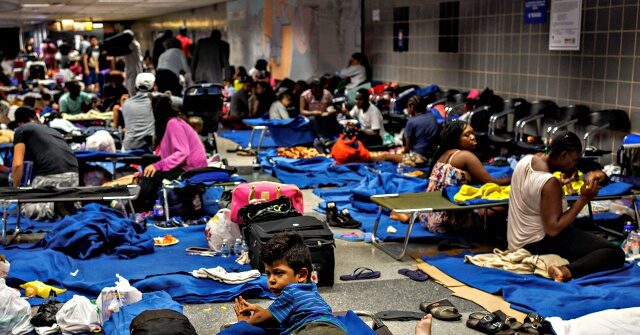

GOP Senators blocked a hidden migration bailout for the Democrats’ sanctuary cities and states when they voted against the border bill pushed by Sen. Mitch McConnell (R-KY).
The GOP revolt leaves Democrat mayors and city politicians scrambling for funds they need to support and hide President Joe Biden’s growing population of poor migrants during the 2024 election year.
“It’s a huge problem for the Democrats because the Biden administration was counting on being able to shovel all this money onto the state and local allies,” said Jessica Vaughan, the policy director at the Center for Immigration Studies, adding:
The Governor of Massachusetts is feeling the squeeze in a huge way. She’s having to cut firefighter budgets and take over inner-city recreational complexes and keep paying for all these hotel rooms for this huge number of illegal migrants. Now there is no help on the way. The check is not in the mail.
“The state estimates it will cost $915 million to keep the emergency shelters running [in 2024],” the Boston Globe reported in December 2023.
Democrats are now pushing to transfer Medicaid funding for poor Americans to provide housing and aid subsidies to the Democrats’ imported migrants.
“In terms of what we can do in the short term for Massachusetts, the Medicaid waiver to provide Medicaid funding for shelter and services is the best avenue for federal funding,” Rep. Jacob Auchincloss (D-MA) told a Boston TV station on February 9.
“But it’s not comprehensive — we needed this bill and I’m going to keep fighting for this bill,” he added.
The state’s welcome for migrants has attracted roughly 30,000 penniless migrants whose welfare has already consumed hundreds of millions of the state’s dollars. That money has flooded into the Democrats’ network of non-profits that are hired to shelter and feed the migrants.
The leaders‘ wealth transfer is angering the Democrats’ base voters.
“I see homeless folks in the streets of New York all the time that are American citizens,” sportscaster Stephen Smith said on February 6:
I damn sure see them in California. We’ve got poor, impoverished, starving people who were born and raised in this nation. How in the hell do we come up with a $53 million pilot program for illegals, but folks who are here legally, are born here, we don’t have enough of them? Just like we could come up with billions for Ukraine, but somehow, some way, we can’t fix the Homeland problem.
Auchincloss and other Democrats recognize the risk created by their migrant arrivals, but dare not oppose the party leaders’ preference for migrants over Americans:
I have visited the migrants in my district in Swansea and elsewhere, I’ve seen the conditions that they’re in. This border crisis is not fair to the migrants [emphasis added]. It’s also not fair to Massachusetts taxpayers who are shouldering tremendous financial burdens to provide shelter and services.
The failed bill was drafted by the pro-migration Democratic leaders and by Mitch McConnell, the top GOP leader in the Senate. The text was so skewed in favor of more migration that the elected GOP caucus forced McConnell to disavow the deal.
The 380-page legislation asked for roughly $5 billion in funds to aid migrants — plus another $5.6 billion in aid for unspecified “populations.”
The request included $2.33 billion for ‘‘Refugee and Entrant Assistance … for grants or contracts with qualified organizations, including nonprofit entities, to provide culturally and linguistically appropriate services, including wraparound services, housing assistance, medical assistance, legal assistance, and case management assistance.”
The U.S. Customs and Border Protection agency would have gotten $6 billion, but “$1,400,000,000 shall be transferred to ‘’Federal Emergency Management Agency—Federal Assistance’ to support sheltering and related activities provided by non-Federal entities through the Shelter and Services Program.”
The U.S. Immigration and Customs Enforcement would have received $7.6 billion, of which “$1,287,102,000 shall be for …. the Alternatives to Detention program.” The program is used to release economic migrants into the care of Democrat-affiliated non-profits, even though federal laws say the migrants should be detained.
Once released, migrants will work jobs to pay off their high-interest debts, and to fund the transfer of their families from their home countries into Americans’ communities.
Sen. Chris Murphy: Congress “has failed to deliver for the people we care about most, the undocumented Americans in this country.” pic.twitter.com/UJjehYiFr1
— Immigration Reform Law Institute (@IRLILaw) February 8, 2024
Also, the Justice Department was given funds to sneak work permits, lawyers, and legal status to migrants:
$404,000,000 shall be for Immigration Judge Teams, including appropriate attorneys, law clerks, paralegals, court administrators, and other support staff, as well as necessary court and adjudicatory costs, and $36,000,000 shall be for [legal] representation for certain incompetent adults.
The bill also included additional payouts to government accounts that could be quietly redirected toward Democrat-run cities.
For example, the Department of State would have gotten $5.6 billion for “humanitarian needs” and $3.5 billion for “migration and refugee assistance” for Israel, Ukraine, and “for other vulnerable populations and communities.”
“They had plans for a fund to process [migrant] people from all over the place, ” Vaughan said.
The many funds in the border bill were intended to feed the Democrats’ vast network of non-profit Non-Governmental Organizations (NGOs), said Vaughan.
“It’s a vast [international] network of organizations — it is faith-based groups, NGOs, contractors, and state and local agencies,” said Vaughan.
After @JamesOKeefeIII exposed that the Casa Alitas Ramada Hotel in Tucson was housing illegals, I made a stop to see how American taxpayer dollars are being spent.
These NGOs aiding illegals are receiving federal dollars, and it’s Congress’ duty to provided oversight.
We were… pic.twitter.com/fU517H7jXQ
— Rep. Tom Tiffany (@RepTiffany) February 9, 2024
City and state officials “view these grants and contracts as beneficial [like] the old-fashioned Republican officials used to view the defense contracts,” Vaughan said.
The groups employ many Democrat activists, she said, adding, “This is a moneymaker for these people, this is how they’re making a great living.”
The groups collectively serve as a “northside migration cartel,” which supports poor migrants who are relayed from their home countries to Democrat cities via a chain of smugglers and cartels in Mexico and federal agencies along the border, Vaughan said.
Ana & her family found asylum in America thanks to organizations like @GlobalRefuge.
Her three deaf children received life-changing health care & Ana even hopes to open a restaurant one day.
Asylum is a right & families like Ana’s make America better.https://t.co/sNWNJonFGj
— Congressman Greg Casar (@RepCasar) February 7, 2024
But the failure of the border bill will not starve the northside cartel, she added.
Democrats in the federal government have many ways to smuggle other funds into their northside cartel, she said. “It’s very hard to track,” she said.
They end up utilizing some of the already existing, long-standing federal grant programs to state and local governments that were originally established for other purposes, but which they slyly redefine, or write in the regulations that the state and local governments can have extra flexibility in how they’re spending the money. For example, there’s a fund of federal money that is intended to pour grants to school districts for homeless students … Over the years, they’ve allowed school districts to use that pot of money for support programs for [younger migrants dubbed “Unaccompanied Alien Children] UACs …
They take a “Whole of government approach” to these things. So they’ll find every extra penny that they can find in every grant program, and try to make that available for state and local allies to cushion the blow.
One recent report by OpentheBooks.com estimated that the Department of Health and Human Services spent roughly $20 billion on migrant aid programs in 2022 and 2023.
Many Democratic-run cities are now cutting funds for Americans to shelter and hide their new migrant population.
“Since October 2022, [Chicago] has spent $138 million to support the thousands of migrants arriving mostly from Texas, and the public has been left largely in the dark about where the money is going,” Axios reported in December 2023.
In Colorado, “The City of Denver is preparing to spend 10% of this year’s general fund budget on the migrant crisis, according to a January 2 report by 9News.com, which added:
If a high number of migrants continue to arrive in Denver and the city continues to shelter them, Mayor Mike Johnston said it’s estimated to cost $180 million in 2024.
…
“I have my granddaughter who is seven years old. We live in the tents. It’s sad because we can’t sleep. The cold is too much,” said Nairez, a migrant living in the camp with 10 family members.
Nairez made it to Denver after months traveling from Venezuela. Her grandchildren are six months and seven years old. In between coughing, her granddaughter Camila tells us she’s sick all the time and her family doesn’t have the money to buy her the medicine she needs.
The costs are rising faster in New York, according to a February 6 forecast by Mayor Eric Adams:
Testifying at the State Capitol in Albany, the mayor told lawmakers that the state would need to pony up at least half the cost of caring for migrants to keep the city from making drastic budget cuts, a figure his team put at $4.6 billion.
“We’re the economic engine of the state,” Mr. Adams said. “And we’ve always been here for the state. We need the state now to be here for us in the city.”
The costs are also imposed on many small towns, such as Whitewater, Wisconsin, and many counties, such as Rockland County, New York.
A reasonable estimate, Vaughan said, is that the federal government annually spends “between $5 billion and $10 billion” quietly settling migrants in the United States, she added.
The money is appropriated each year inside the agencies’ budget, and usually without any visible oversight by Republican members of the Hosue and Senate appropriations committee, she said.
Regardless of how much is spent to settle new migrants, she said, it “is going to pale next to the amount of money that is going to be required over the lifetime of these new migrants” to keep them out of poverty.




